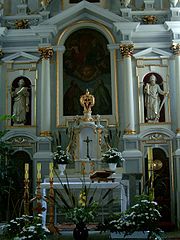
A History Of The Mass And Its Ceremonies In The Eastern And Western Church -Rev John O'Brien A.M.
WHOSE DUTY IT WAS TO PREACH
Whenever the bishop presided, as used to be the case in nearly all the cathedral churches, the duty of preaching devolved upon him. This duty was, indeed, regarded in early times as so peculiar to a bishop that whenever a priest addressed the people in any public church it was looked upon as a sort of great concession and favor. “Episcopi proprium munus,” says St. Ambrose (De Off. Sac., lib. i. c. i), “docere populum”—“It is the peculiar office of the bishop to teach the people”; and St. Chrysostom, commenting on this faculty, says that the bishop who does not possess it should be deposed from his office (Hom. x in I. Ep. ad Tim.)
During the prevalence of the early heresies, the greatest care was taken to see that no one should ascend the pulpit unless he possessed the rarest qualities as a preacher and theologian. This was especially the case when the heresy of Arius broke out. So dangerous was this considered to be that it was thought well all through the East to confine preaching solely to bishops, and forbid priests under severe penalties to take upon themselves this task. The Council of Chalcedon (A.D. 451), as is well known, interdicted preaching to monks, on account of the fall of Eutyches, one of the heads of this body (Comment. in Pontif. Romanum, Catalani; Mühlbauer, i. 133).
Copyright ©1999-2023 Wildfire Fellowship, Inc all rights reserved

 Keep Site Running
Keep Site Running